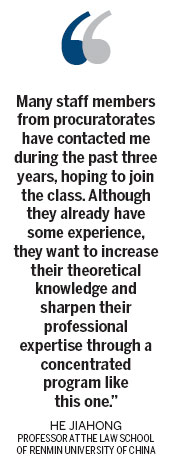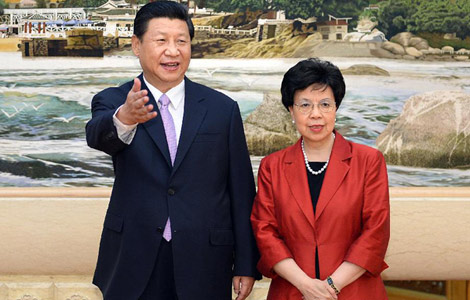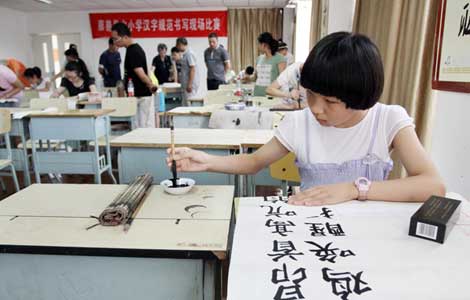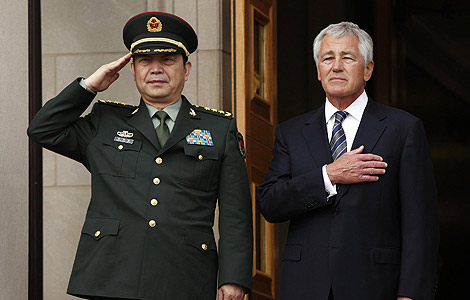Graduates hope to bust graft in China
Updated: 2013-08-21 07:35
By Zhang Yuchen, Wu Wencong and Tang Yue (China Daily)
|
||||||||
|
The first students of the so-called anti-corruption master class celebrate their graduation in June. Having completed three years' of study, more than half of the 24 graduates entered the procuratorate system to fulfil their ambitions of cracking down on corrupt officials. Provided to China Daily |
|
Staff members of the Procuratorate in Fuzhou, the capital of Fujian province, visit an anti-corruption exhibition held at a prison in the city. Zhang Guojun / Xinhua |

Students to fight corruption, report Zhang Yuchen, Wu Wencong and Tang Yue in Beijing.
Li Chuanwen has a very specific role among the other ambitious, new prosecutors: He has been specially trained to nail corrupt officials.
Li is one of the first batch of 24 graduates of a master's program called "Investigation into Graft and Malfeasance of Duty", popularly known as the anti-corruption master-level class, run by Renmin University of China and the Supreme People's Procuratorate of China.
During the three-year program, the 27-year-old, who works at a district prosecutor's office in Beijing, has acquired a raft of technical skills, including the collection of physical evidence, fingerprinting and interrogation.
Meanwhile, business graduate Li and his classmates have also learned how to use a lie detector and have honed their interrogation techniques through role-playing in a mock interview room, while the rest of the class observed the proceedings from behind a one-way mirror.
"The students wouldn't have attracted so much public attention if China's anti-corruption drive hadn't become such a hot topic," said He Jiahong, a professor at the Law School of Renmin University of China who founded the program. "If not for that, it might have been seen as just another new course provided by a law school."
'Tigers' and 'flies'
The battle against corruption has been at the top of the political agenda since China's new leadership took office in March. The Chinese Communist Party chief, Xi Jinping, has vowed to "put power in a cage of regulations" and initiated a crackdown on corruption, aimed at "tigers" and "flies", references to high- and low-ranking officials.
After years of research into criminal investigations, He believes that the public security departments have formulated a set of mature investigative techniques and a stable training and education system.
"But procuratorates, especially at the grass-roots level, lack professional investigators who can work effectively and efficiently," he said, adding that he regards the problem as a failure of skill sets and launched the course to rectify the situation.
The program started three years ago with 24 students. When they graduated this summer, 15 went to grass-roots level prosecution offices and three began work at municipal-level justice departments. The rest decided not to pursue careers in the anti-corruption drive.

The school has close ties with procuratorate departments and regularly invites working officials to deliver lectures. Officials and prosecutors have provided exclusive four-hour seminars and spoken about the practical side of anti-corruption activities.
The seminars are only open to the "anti-corruption majors" and students are forbidden from discussing the contents of the conversations and seminars with outsiders.
Eight high-level officials have mentored the students during internships and advised them on how to find jobs.
During the final year of the program, the students worked as interns in various departments of the procuratorate system, and some even gained first-hand experience by participating in actual investigations.
He said the program looks for candidates with a strong overall performance level, especially in logic and analytical skills. The students come from a wide range of backgrounds; some are economics graduates, while others have studied accounting, computer science and journalism, skills that could be a huge advantage in their future careers.
Motivation is a key factor. He recalled an enrolment interview he conducted back in 2010 with an applicant whose family had been involved in a lawsuit and lost. The young man was convinced that his family lost the case because they had no contacts within the procuratorate. In response, he applied for the course so the family would gain that connection.
He said he was so saddened by the statement that he didn't approve the application.
By contrast, Qu Sainan, who has a degree in social work, said she joined the program because she has been always enthusiastic about graft busting. "The dream of becoming a prosecutor encouraged me to apply when I finished college."
High ethical standards
At the start of the first year, He and the students agreed that the students would not offer gifts to the teachers and if students and teachers dined out together, the teachers would pay their own way. The students also designed their own class badge to inspire a sense of pride and responsibility.
The course will help make the fight against corruption more professional and specialized, said Ren Jianming, a professor at Tsinghua University who is a specialist in the study of corruption.
He, the course director, is unhappy that only around half of the graduates have joined the procurator's office. He conceded that some would have been discouraged by the knowledge that they would have to take the civil service entry exams that are a requirement for all who wish to enter the system.
Recruitment for this year's intake will begin in the first week in September and the course will start in October. He has already received a number of e-mails from prospective students who expressed an interest in attending the course.
He has his own ideas and expectations for the class and guaranteed that the contents will be weightier in the future, with more input from lecturers already working within the system.
The number of places on the course has been reduced from 24 to 18 to ensure that each teacher is responsible for no more than three students.
"Many staff members from procuratorates have contacted me during the past three years, hoping to join the class. Although they already have some experience, they want to increase their theoretical knowledge and sharpen their professional expertise through a concentrated program like this one," he said. "This may be one of the biggest changes for the program in the future."
Great expectations
Suspicion and criticism have been constant factors since the program was launched. Some experts think it focuses on trifling matters. In public comments made in 2010, Wang Guixiu, a retired professor from the Central Party School, described the course as, "a waste of time and effort on useless stuff rather than focusing on the things scholars have been calling for over many years."
He said he is under no illusion that the students who emerge as fully fledged investigators will somehow sweep the country clean of corruption overnight. He warned that even good apples can turn bad.
"In fact, it wouldn't surprise me if one of them is exposed as a corrupt official someday," he said. "I can only be responsible for their time on campus, but, of course, some may go out of control later on."
Li felt that many commentators harbor unrealistic expectations for this small group of graft-busting graduates and fears that the public expects too much, too soon.
"Some online commentators have said they will look at our post-graduate work in the procuratorate and assess the effectiveness of our anti-corruption work, but this is a long-term project and I think people are overestimating the effect we can have in the short term," said Li.
Contact the writers at zhangyuchen@chinadaily.com.cn and wuwencong@chinadaily.com.cn
(China Daily USA 08/21/2013 page7)

 Merkel makes historic visit to Nazis' Dachau camp
Merkel makes historic visit to Nazis' Dachau camp
 Chinese fleet sets sail for joint drills
Chinese fleet sets sail for joint drills
 President Xi meets WHO director-general
President Xi meets WHO director-general
 Everyman movie star
Everyman movie star
 Rural boarding schools need dorm managers
Rural boarding schools need dorm managers
 Center of hope and support
Center of hope and support
 Chinese characters under threat in digital age
Chinese characters under threat in digital age
 US, China to expand military exchanges
US, China to expand military exchanges
Most Viewed
Editor's Picks

|

|

|

|

|

|
Today's Top News
NBA hosts Chinese basketball coaches
China urges US flexibility on N. Korea
China asked to help in African mining
Dispute slows positive trend on Korean Peninsula
Expanded Sino-US exchanges to stabilize ties
Chinese fleet sets sail for joint drills
Premier Li stresses need for reform
Children with HIV live in fear
US Weekly

|

|









